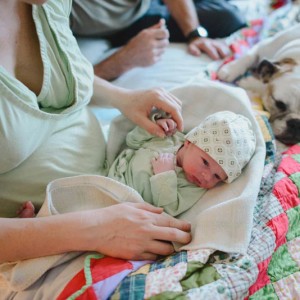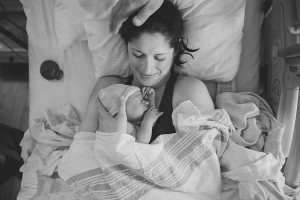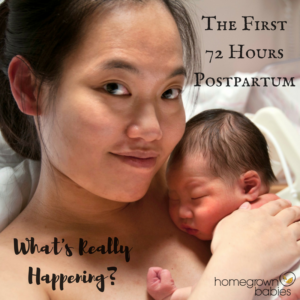During pregnancy, we focus so much on the birth itself, that we often overlook the postpartum time; we write birth plans but don’t plan for what our needs will be after baby arrives. This time is so precious and fleeting; taking a moment to think through those first few hours, days, and even weeks to envision how you want to welcome your baby allows her life to unfold gently into the world, and makes all the difference in setting a healthy foundation for mothering and breastfeeding in the coming months.
Making a postpartum plan, just as you have probably done for your birth, can help you feel safe, strong, and supported in the postpartum.
Women often wonder what should be factored in to the postpartum plan. For starters, skin to skin (STS) contact is highly important between moms and babies, and is even recommended by the American Academy of Pediatrics. The benefits include:
- Helps keep baby warm; mom’s breasts are the best baby warmers- they can change temperature individually by up to 2 degrees celsius!
- Increases oxytocin levels in both mom and baby; mother’s are shown to cuddle their babies more often, even a year after the birth, when initial STS happens.
- Helps colonize the baby with mom’s bacteria to develop healthy immunity.
- Helps stabilize infant glucose levels.
- Establishes good milk supply.
Speaking of milk supply, getting breastfeeding off to a good start is another important factor in planning. How can we do that?
- Encourage immediate STS by placing baby on mama’s belly/chest immediately after birth. Newborn procedures such as apgar scores and suctioning can be done right there if both mom and baby are healthy.
- Secretory activation of the breasts begins when the placenta is born, and frequent stimulation of the breasts during the first 72 hours is vital to ensure that the prolactin receptors switch on to release colostrum, to help bring in mature milk, and to set the stage for milk supply moving forward.
- Practice baby-led breastfeeding. Don’t force the first latch, but encourage it within 30-90 minutes after birth.
- Keep mom and baby together at all times. Delay interventions such as vitamin K and eye drops until after baby has nursed for the first time.
- Take advantage of the lactation consultants on staff!
And what about babies themselves? What can we expect from them in the first hours and days after birth? Babies need to recover from the process of being born, and having a clear understanding of what the natural stages are that occur after birth can help facilitate breastfeeding and make for a more nurturing transition for baby into the world:
- First Stage – the first 30-50 minutes after birth. Babies are usually alert and active, making rooting cues and turning its head toward mother’s voice. If unmedicated and placed on the mother’s abdomen with minimal interference, they can self-crawl to the breast which allows for an easier initial latch. This can take up to 90 minutes.
- Second Stage – occurs from about 30-120 minutes postpartum. The baby is less responsive to breastfeeding than during the first stage, seems sleepier and shows less motor activity as they prepare for recovery sleep.
- Third stage- occurs from 2 to 8-10 hours postpartum. Babies usually go into a deep recovery sleep which can be difficult to arouse them from. If they latch, they tend to fall asleep at the breast. They also tend to have more mucus, gagging, and vomiting to clear the lungs. As baby emerges from this recovery stage, they show more interest in nursing.
- 24-48 hours postpartum- increased wakefulness, cluster feeds, and increased feeding in general- typically more than 8 times per day, and several times at night.
- 48-72 hours- Baby sleeps both deeply and lightly, and continues to feed frequently.
Just as laboring women need to feel safe and supported, so do new mamas and babies.
 And just like labor contractions will often slow down when women feel anxious or afraid, milk flow can too. Postpartum women need just as much support as laboring women, but too often after the birth focus shifts away from women and directly onto babies, rather than mama/baby as a symbiotic relationship. In this fast-paced, fiercely independent culture, we expect women to “bounce back” or “suck it up” when in reality, our basic human physiology really needs for us to slow down and be taken care of. How can partners, family, and friends support new mothers? It’s the little things make all the difference…
And just like labor contractions will often slow down when women feel anxious or afraid, milk flow can too. Postpartum women need just as much support as laboring women, but too often after the birth focus shifts away from women and directly onto babies, rather than mama/baby as a symbiotic relationship. In this fast-paced, fiercely independent culture, we expect women to “bounce back” or “suck it up” when in reality, our basic human physiology really needs for us to slow down and be taken care of. How can partners, family, and friends support new mothers? It’s the little things make all the difference…
- Turn off phones, or at least silence them. Constant interruption keeps us in a state of low-level anxiety, and impacts our ability to remain in the present moment.
- Create a safe space, just like in labor, so your baby can be instinctive and your milk can begin to flow. Low lights, calm environment, supportive people.
- Breastfeeding is like labor- you breastfeed(contract), hydrate, then rest, breastfeed, hydrate, then rest… in addition to plenty of meals and snacks throughout the day.
- New mamas should not be left alone for the first few weeks; this is so imperative that in other countries and cultures, this is built into the maternity system with visiting nurses and other care professionals. If you do not have a great support network of family and friends, seriously consider hiring a postpartum doula.
- On the other hand, too many visitors can create stress for both babies and mothers. Finding a good balance is key. A general rule of thumb is that if you aren’t comfortable being topless in front of someone, it’s a good idea to limit the visit to one hour. And as a new mother, you should not need to “entertain” your guests! Even a 15-minute conversation can be exhausting in the early days and weeks, so be gentle with yourself.
As you can see, there are many small things that can add up to have a major impact on your postpartum experience. Thinking these things through ahead of time, talking them over with your partner, and sharing your wishes with family and friends can help create a network of support that allows you the time you need to bond with your new baby, feel confident in breastfeeding, recover from the birth, and settle into life as a new mother.




